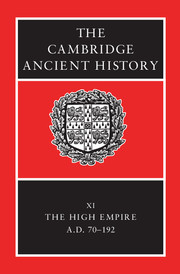Book contents
- Frontmatter
- PART I NARRATIVE
- PART II GOVERNMENT AND CIVIL ADMINISTRATION
- 4 The emperor and his advisers
- 5 Emperor, Senate and magistrates
- 6 The growth of administrative posts
- 7 Provincial administration and finance
- PART III THE EMPIRE
- PART IV ROME, ITALY AND THE PROVINCES
- PART Va ECONOMY AND SOCIETY
- PART Vb ART AND CULTURE
- Chronological Table
- BIBLIOGRAPHY
- Index
- 1 The Roman world in the time of Marcus Aurelius
- 7 The Danube provinces
- References
5 - Emperor, Senate and magistrates
from PART II - GOVERNMENT AND CIVIL ADMINISTRATION
Published online by Cambridge University Press: 28 March 2008
- Frontmatter
- PART I NARRATIVE
- PART II GOVERNMENT AND CIVIL ADMINISTRATION
- 4 The emperor and his advisers
- 5 Emperor, Senate and magistrates
- 6 The growth of administrative posts
- 7 Provincial administration and finance
- PART III THE EMPIRE
- PART IV ROME, ITALY AND THE PROVINCES
- PART Va ECONOMY AND SOCIETY
- PART Vb ART AND CULTURE
- Chronological Table
- BIBLIOGRAPHY
- Index
- 1 The Roman world in the time of Marcus Aurelius
- 7 The Danube provinces
- References
Summary
The senator Pliny the Younger called the emperor Trajan ‘one of us’ (unus ex nobis), and his elder contemporary Martial sought to distinguish Nerva from his predecessor Domitian with the observation that he was not ‘the dominus, but rather the imperator and the most upright senator of all’. Yet the same Pliny when discussing secret voting in the Senate, can also speak of depending on the will of one man. Thus the emperor was portrayed as the princeps in the Senate and, at the same time, as its ‘ruler’. A benevolent yet astute observer such as Pliny can preach the ruling ideology, but at the same time he cannot avoid seeing and describing the stark contrast between this and the reality. But, while individuals could overcome the gap between the ideology and reality, it was never bridged in public proclamations. The relationship between emperor and Senate was always the result of the tension between what the majority of senators thought the emperor should be, and what he really was, or could become: princeps or dominus. This tense relationship found succinct expression either in the emperor's readiness to swear an oath that he would not allow a senator to be killed, or in the refusal so to swear. The actions of Titus and Domitian well illustrate this contrast. But, as ever, the proprieties and the forms of words used in relations between the emperor and senators were fixed. Hardly anyone could deny the necessary dependence of the Senate on the emperor, not least because of the annual oath of senators in the acta of the emperor.
- Type
- Chapter
- Information
- The Cambridge Ancient History , pp. 214 - 237Publisher: Cambridge University PressPrint publication year: 2000
References
- 9
- Cited by

